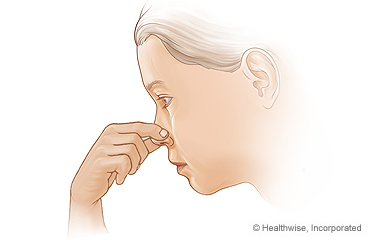
Overview
Nosebleeds are common, especially if you have colds or allergies. Many things can cause a nosebleed.
Some nosebleeds stop on their own with pressure. Others need packing. Some get cauterized (sealed). If you have gauze or other packing materials in your nose, you will need to follow up with your doctor to have the packing removed. You may need more treatment if you get nosebleeds a lot.
Follow-up care is a key part of your treatment and safety. Be sure to make and go to all appointments, and call your doctor if you are having problems. It's also a good idea to know your test results and keep a list of the medicines you take.
How can you care for yourself at home?
- If you get another nosebleed:
- Gently blow your nose to clear any clots.
- Sit up and tilt your head slightly forward. This keeps blood from going down your throat.
- Use your thumb and index finger to pinch the front, soft part of your nose shut for at least 15 minutes. Use a clock. Do not check to see if the bleeding has stopped before the 15 minutes are up. If the bleeding has not stopped, pinch your nose shut for another 10 to 15 minutes. Using a nasal decongestant spray such as oxymetazoline (Afrin) before pinching your nose can also help to stop the bleeding. Be safe with medicines. Read and follow all instructions on the label.
- When the bleeding has stopped, try not to pick, rub, or blow your nose for several hours. Avoiding these things helps keep your nose from bleeding again.
To prevent nosebleeds
- Don't blow your nose too hard.
- Try not to lift or strain after a nosebleed.
- Raise your head on a pillow while you sleep.
- Put a thin layer of a saline- or water-based nasal gel, such as NasoGel, inside your nose. Put it on the septum, which divides your nostrils. This will prevent dryness that can cause nosebleeds.
- Use a vaporizer or humidifier to add moisture to your bedroom. Follow the directions for cleaning the machine.
- Do not use ibuprofen (Advil, Motrin) or naproxen (Aleve) for 36 to 48 hours after a nosebleed unless your doctor tells you to. You can use acetaminophen (Tylenol) for pain relief.
- Talk to your doctor about stopping any other medicines you are taking. Some medicines may make you more likely to get a nosebleed.
- Do not use cold medicines or nasal sprays without first talking to your doctor. They can make your nose dry.
- Do not snort tobacco, drugs, or any other drying substances up your nose.
When should you call for help?
Call 911 anytime you think you may need emergency care. For example, call if:
- You passed out (lost consciousness).
Call your doctor now or seek immediate medical care if:
- Your nose is still bleeding after you have pinched the nose shut 2 times for 15 minutes each time (30 minutes total).
- There is a lot of blood running down the back of your throat even after you pinch your nose and tilt your head forward.
- You feel weak or lightheaded.
- You have a nosebleed after a head injury.
Watch closely for changes in your health, and be sure to contact your doctor if:
- You get nosebleeds often, even if they stop.
- You do not get better as expected.
Where can you learn more?
Go to http://www.healthwise.net/patientEd
Enter U141 in the search box to learn more about "Nosebleeds in Teens: Care Instructions".
Current as of: October 27, 2024
Author: Ignite Healthwise, LLC Staff
Clinical Review Board
All Healthwise education is reviewed by a team that includes physicians, nurses, advanced practitioners, registered dieticians, and other healthcare professionals.

